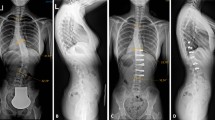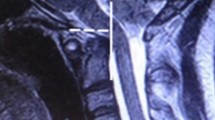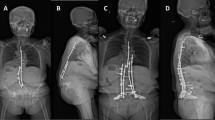Abstract
Introduction
The surgical management of craniovertebral junction instability in pediatric patients has unique challenges. While the indications for internal fixation in children are similar to those of adults, the data concerning techniques, complications, and outcomes of spinal instrumentation comes from experience with adult patients. Diminutive osseous and ligamentous structures and anatomical variations associated with syndromic craniovertebral abnormalities frequently complicates the approaches and limits the use of internal fixation in children. Cervical arthrodesis in the pediatric age group has the potential for limiting growth potential and causing secondary deformity. Recent advances in image analysis have enabled preoperative planning which is critical to evaluate the size of instrumentation and its relation to the patient’s anatomy. Newer techniques have recently evolved and have been incorporated in the management of pediatric patients with requirement for craniocervical stabilization.
Materials and methods
Over 750 craniovertebral junction fusions have been reviewed in children. The indications for atlantoaxial arthrodesis were: (a) absent odontoid process, dystopic os odontoideum, absent posterior arch of C1; (b) Morquio’s syndrome, Goldenhar’s syndrome, Conradi’s syndrome, and spondyloepiphyseal dysplasia. The acquired abnormalities of trauma, postinfectious instability, and Down’s syndrome completed the indication in children. The indications for occipitocervical fusion were: (a) anterior and posterior bifid C1 arches with instability, absent occipital condyles; b) severe reducible basilar invagination, unstable dystopic os odontoideum, and unilateral atlas assimilation; (c) acquired phenomenon with traumatic occipitocervical dislocation, complex craniovertebral junction fractures of C1 and C2, after transoral craniovertebral junction decompression, cranial settling in Down’s syndrome and inflammatory disease such as Grisel’s syndrome. Instability was seen in children with clivus chordoma and osteoblastoma. Atlantoaxial fusions were performed mainly with interlaminar rib graft fusion and more recently with the transarticular screw fixation in the older patient. In the teenager, lateral mass screws at C1 and rod fixation were made; C2 pars interarticular screw fixation and C2 pedicle screw fixation. A C2 translaminar screw fixation is described. Occipitocervical fusions were made utilizing rib grafts below the age of 6. A contoured loop fixation was made in children above the age of 7, and recently, rod and screw fixation was also utilized.
Results
Abnormal cervical spine growth was not seen in children who underwent craniocervical stabilization below the age of 5. The authors have reserved rigid instrumentation for children above the age of 10 years and dependent on the anatomy.






















Similar content being viewed by others
References
Abumi K, Kaneda K, Shono Y, Fujiya M (1999) One-stage posterior decompression and reconstruction of the cervical spine by using pedicle screw fixation systems. J Neurosurg 90:19–26
Abumi K, Shono Y, Ito M, Taneichi H, Kotani Y, Kaneda K (2000) Complications of pedicle screw fixation in reconstructive surgery of the cervical spine. Spine 25:962–969
Aebi M, Etter C, Coscia M (1989) Fractures of the odontoid process. Treatment with anterior screw fixation. Spine 14:1065–1070
Anderson LD, D’Alonzo RT (1974) Fractures of the odontoid process of the axis. J Bone Joint Surg Am 56:1663–1674
Apfelbaum RI, Lonser RR, Veres R, Casey A (2000) Direct anterior screw fixation for recent and remote odontoid fractures. J Neurosurg 93:227–236
Apostolides PJ, Karahalios DG, Yapp RA, Sonntag VK (1998) Use of the BendMeister rod bender for occipitocervical fusion: technical note. Neurosurgery 43:389–390, discussion 391
Baron EM, Loftus CM, Vaccaro AR, Dominique DA (2006) Anterior approach to the subaxial cervical spine in children: a brief review. Neurosurg Focus 20:E4
Benzel EC (1996) Anatomic consideration of C2 pedicle screw placement. Spine 21:2301–2302
Bhanot A, Sawhney G, Kaushal R, Aggarwal AK, Bahadur R (2006) Management of odontoid fractures with anterior screw fixation. J Surg Orthop Adv 15:38–42
Bohler J (1982) Anterior stabilization for acute fractures and non-unions of the dens. J Bone Joint Surg Am 64:18–27
Brockmeyer DL, York JE, Apfelbaum RI (2000) Anatomical suitability of C1–2 transarticular screw placement in pediatric patients. J Neurosurg 92:7–11
Brooks AL, Jenkins EB (1978) Atlanto-axial arthrodesis by the wedge compression method. J Bone Joint Surg Am 60:279–284
Clark CR, White AA 3rd (1985) Fractures of the dens. A multicenter study. J Bone Joint Surg Am 67:1340–1348
Cohen MW, Drummond DS, Flynn JM, Pill SG, Dormans JP (2001) A technique of occipitocervical arthrodesis in children using autologous rib grafts. Spine 26:825–829
Dickman CA, Sonntag VK, Papadopoulos SM, Hadley MN (1991) The interspinous method of posterior atlantoaxial arthrodesis. J Neurosurg 74:190–198
Dickman CA, Crawford NR, Paramore CG (1996) Biomechanical characteristics of C1–2 cable fixations. J Neurosurg 85:316–322
Dogan S, Safavi-Abbasi S, Theodore N, Horn E, Rekate HL, Sonntag VK (2006) Pediatric subaxial cervical spine injuries: origins, management, and outcome in 51 patients. Neurosurg Focus 20:E1
Ebraheim NA, Fow J, Xu R, Yeasting RA (2001) The location of the pedicle and pars interarticularis in the axis. Spine 26:E34–E37
Farey ID, Nadkarni S, Smith N (1999) Modified Gallie technique versus transarticular screw fixation in C1–C2 fusion. Clin Orthop Relat Res 359:126–135
Fountas KN, Kapsalaki EZ, Karampelas I, Feltes CH, Dimopoulos VG, Machinis TG, Nikolakakos LG, Boev AN 3rd, Choudhri H, Smisson HF, Robinson JS (2005) Results of long-term follow-up in patients undergoing anterior screw fixation for type II and rostral type III odontoid fractures. Spine 30:661–669
Gallie WE (1939) Fractures and dislocations of the cervical spine. Am J Surg 46:495–499
Geisler FH, Cheng C, Poka A, Brumback RJ (1989) Anterior screw fixation of posteriorly displaced type II odontoid fractures. Neurosurgery 25:30–37, discussion 37–38
Gluf WM, Brockmeyer DL (2005) Atlantoaxial transarticular screw fixation: a review of surgical indications, fusion rate, complications, and lessons learned in 67 pediatric patients. J Neurosurg Spine 2:164–169
Goel A, Laheri V (1994) Plate and screw fixation for atlanto-axial subluxation. Acta Neurochir (Wien) 129:47–53
Goel A, Desai KI, Muzumdar DP (2002) Atlantoaxial fixation using plate and screw method: a report of 160 treated patients. Neurosurgery 51:1351–1356, discussion 1356–1357
Grob D, Jeanneret B, Aebi M, Markwalder TM (1991) Atlanto-axial fusion with transarticular screw fixation. J Bone Joint Surg Br 73:972–976
Grob D, Crisco JJ 3rd, Panjabi MM, Wang P, Dvorak J (1992) Biomechanical evaluation of four different posterior atlantoaxial fixation techniques. Spine 17:480–490
Hadley MN, Browner C, Sonntag VK (1985) Axis fractures: a comprehensive review of management and treatment in 107 cases. Neurosurgery 17:281–290
Hadley MN, Zabramski JM, Browner CM, Rekate H, Sonntag VK (1988) Pediatric spinal trauma. Review of 122 cases of spinal cord and vertebral column injuries. J Neurosurg 68:18–24
Hadley MN, Dickman CA, Browner CM, Sonntag VK (1989) Acute axis fractures: a review of 229 cases. J Neurosurg 71:642–647
Hanley EN Jr, Harvell JC Jr (1992) Immediate postoperative stability of the atlantoaxial articulation: a biomechanical study comparing simple midline wiring, and the Gallie and Brooks procedures. J Spinal Disord 5:306–310
Harms J, Melcher RP (2001) Posterior C1–C2 fusion with polyaxial screw and rod fixation. Spine 26:2467–2471
Howington JU, Kruse JJ, Awasthi D (2001) Surgical anatomy of the C-2 pedicle. J Neurosurg 95:88–92
Jeanneret B, Vernet O, Frei S, Magerl F (1991) Atlantoaxial mobility after screw fixation of the odontoid: a computed tomographic study. J Spinal Disord 4:203–211
Jeanneret B, Magerl F (1992) Primary posterior fusion C1/2 in odontoid fractures: indications, technique, and results of transarticular screw fixation. J Spinal Disord 5:464–475
Julien TD, Frankel B, Traynelis VC, Ryken TC (2000) Evidence-based analysis of odontoid fracture management. Neurosurg Focus 8:e1
Klimo Jr P, Apfelbaum RI (2005) Odontiod screw fixation. In: Kim DH, Vaccaro AR, Fessler RG (eds) Spinal Instrumentation: surgical techniques. Thieme Medical Publishers, New York, NY, pp 70–80
Madawi AA, Casey AT, Solanki GA, Tuite G, Veres R, Crockard HA (1997) Radiological and anatomical evaluation of the atlantoaxial transarticular screw fixation technique. J Neurosurg 86:961–968
Mandel IM, Kambach BJ, Petersilge CA, Johnstone B, Yoo JU (2000) Morphologic considerations of C2 isthmus dimensions for the placement of transarticular screws. Spine 25:1542–1547
Marcotte P, Dickman CA, Sonntag VK, Karahalios DG, Drabier J (1993) Posterior atlantoaxial facet screw fixation. J Neurosurg 79:234–237
Menezes AH (2004) Evaluation and treatment of congenital and developmental anomalies of the cervical spine. Invited submission from the Joint Section Meeting on Disorders of the Spine and Peripheral Nerves, March 2004. J Neurosurg Spine 1:188–197
Menezes AH (2005) Dorsal occipitocervical fusion: rod and wiring techniques. In: Kim DH, Vaccaro AR, Fessler RG (eds) Spinal instrumentation: surgical techniques. Thieme Medical Publishers, New York, NY, pp 14–19
Mitchell TC, Sadasivan KK, Ogden AL, Mayeux RH, Mukherjee DP, Albright JA (1999) Biomechanical study of atlantoaxial arthrodesis: transarticular screw fixation versus modified Brooks posterior wiring. J Orthop Trauma 13:483–489
Naderi S, Crawford NR, Song GS, Sonntag VK, Dickman CA (1998) Biomechanical comparison of C1-C2 posterior fixations. Cable, graft, and screw combinations. Spine 23:1946–1955, discussion 1955–1946
Orenstein JB, Klein BL, Gotschall CS, Ochsenschlager DW, Klatzko MD, Eichelberger MR (1994) Age and outcome in pediatric cervical spine injury: 11-year experience. Pediatr Emerg Care 10:132–137
Paramore CG, Dickman CA, Sonntag VK (1996) The anatomical suitability of the C1–2 complex for transarticular screw fixation. J Neurosurg 85:221–224
Parisini P, Di Silvestre M, Greggi T, Bianchi G (2003) C1–C2 posterior fusion in growing patients: long-term follow-up. Spine 28:566–572, discussion 572
Rekate HL, Theodore N, Sonntag VK, Dickman CA (1999) Pediatric spine and spinal cord trauma. State of the art for the third millennium. Childs Nerv Syst 15:743–750
Resnick DK, Lapsiwala S, Trost GR (2002) Anatomic suitability of the C1–C2 complex for pedicle screw fixation. Spine 27:1494–1498
Robertson SC, Menezes AH (1998) Occipital calvarial bone graft in posterior occipitocervical fusion. Spine 23:249–254, discussion 254–245
Sasso R, Doherty BJ, Crawford MJ, Heggeness MH (1993) Biomechanics of odontoid fracture fixation. Comparison of the one- and two-screw technique. Spine 18:1950–1953
Sawin PD, Traynelis VC, Menezes AH (1998) A comparative analysis of fusion rates and donor-site morbidity for autogeneic rib and iliac crest bone grafts in posterior cervical fusions. J Neurosurg 88:255–265
Subach BR, Morone MA, Haid RW Jr, McLaughlin MR, Rodts GR, Comey CH (1999) Management of acute odontoid fractures with single-screw anterior fixation. Neurosurgery 45:812–819, discussion 819–820
Summers BN, Eisenstein SM (1989) Donor site pain from the ilium. A complication of lumbar spine fusion. J Bone Joint Surg Br 71:677–680
Tanaka T, Ninchoji T, Uemura K, Ryu H, Sugiura M, Ohishi H, Tomita M, Takehara S, Yamamoto T (1992) Multilevel anterior cervical fusion using skull bone grafts. Case report. J Neurosurg 76:298–302
Vaccaro AR, Cirello J (2002) The use of allograft bone and cages in fractures of the cervical, thoracic, and lumbar spine. Clin Orthop Relat Res 394:19–26
Vara CS, Thompson GH (2006) A cadaveric examination of pediatric cervical pedicle morphology. Spine 31:1107–1112
Wright NM, Lauryssen C (1998) Vertebral artery injury in C1–2 transarticular screw fixation: results of a survey of the AANS/CNS section on disorders of the spine and peripheral nerves. American Association of Neurological Surgeons/Congress of Neurological Surgeons. J Neurosurg 88:634–640
Wright NM (2004) Posterior C2 fixation using bilateral, crossing C2 laminar screws: case series and technical note. J Spinal Disord Tech 17:158–162
Xu R, Nadaud MC, Ebraheim NA, Yeasting RA (1995) Morphology of the second cervical vertebra and the posterior projection of the C2 pedicle axis. Spine 20:259–263
Author information
Authors and Affiliations
Corresponding author
Rights and permissions
About this article
Cite this article
Ahmed, R., Traynelis, V.C. & Menezes, A.H. Fusions at the craniovertebral junction. Childs Nerv Syst 24, 1209–1224 (2008). https://doi.org/10.1007/s00381-008-0607-7
Received:
Published:
Issue Date:
DOI: https://doi.org/10.1007/s00381-008-0607-7




